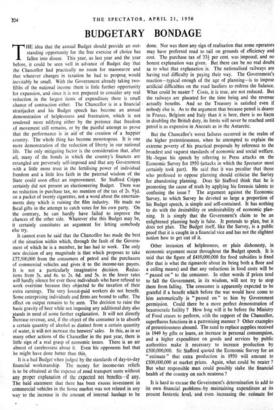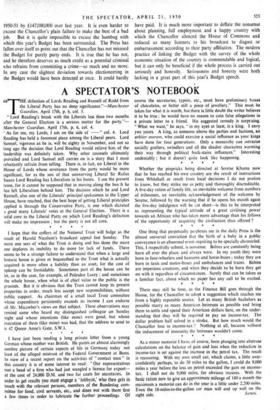BUDGETARY BONDAGE
THE idea that the annual Budget should provide an out- standing opportunity for the free exercise of choice has fallen into disuse. This year, as last year and the year before, it could be seen well in advance of Budget day that the Chancellor had practically no room for manoeuvre and that whatever changes in taxation he had to propose, would inevitably be small. With the Government already taking two- fifths of the national income there is little further opportunity for expansion, and since it is not prepared to consider any real - red uctionin the largest items of expenditure there is small chance of contraction either. The Chancellor is in a financial straitjacket and his Budget speech has become an annual demonstration of helplessness and frustration, which is not rendered more edifying either by the pretence that freedom of movement still remains, or by the painful attempt to prove that the performance is in aid of the creation of a happier country. The whole thing has become monotonous. It is one more demonstration of the reduction of liberty in our national life. The only mitigating factor is the consideration that, after all, many of the bonds in whicli the country's finances are entangled are perversely self-imposed and that any Government with a little more trust in the fertilising power of individual freedom and a little less faith in the paternal wisdom of the State could soon effect an improvement. Sir Stafford Cripps certainly did not present an electioneering Budget. There was no reduction in purchase tax, no mention of the tax of 2s. 91d. on a packet of twenty cigarettes, not a word about the entertain- ments duty which is ruining the film industry. He made no fiscal gifts in the attempt to catch votes for his own party. 'On the contrary, he can hardly have failed to improve the chances of the other side. Whatever else this Budget may be, it certainly constitutes an argument for letting somebody else try.
It cannot even be said that the Chancellor has made the best of the situation within which, through the fault of the Govern- ment of which he is a member, he has had to work. The only new decision of any magnitude is that which proposes to take £77,500,000 from the consumers of petrol and the purchasers of commercial vehicles and gives it to the income-tax payers. It is not a particularly imaginative decision. Reduc- tions from 3s. and 6s. to 2s. 6d. and 5s. in the lower rates will hardly silence for ever those individuals who have refused to work overtime because they objected to the taxation of their extra earnings. The very lowest-paid workers do not benefit. Some enterprising individuals and firms are bound to suffer. The effect on output remains to be seen. The decision to raise the basic gravity of beer while not imposing any additional duty also stands in need of some further explanation. It will not directly Increase revenue, and, if the object of the consumer is to absorb a certain quantity of alcohol as distinct from a certain quantity of water, it will not increase the brewers' sales. In this, as in so many other actions of the Chancellor in the past year, there is little sign of a real grasp of economic issues. There is an air almost of carelessness about it. Even his opponents feel that he might have done better than this.
It is a bad Budget when judged by the standards of day-to-day financial workmanship. The money for income-tax reliefs is to be obtained at the expense of read transport users without any proper explanation of the expected net benefits—if any. The bald statement that there has been excess investment in commercial vehicles in the home market•was 'not related in any ways to- the increase in the amount of internal haulage to be. done. Nor was there any sign of realisation that some operators may have preferred road to rail on grounds of efficiency- and cost. The purchase tax of 331 per cent. was imposed; and no honest explanation was given. But there can 'be no real doubt as to what that explanation'is. The nationalised railways are having real difficulty in paying their way. The Government's reaction—typical enough of the age of planning—is to impose artificial difficulties on the road hauliers to• redress the balance. What could be neater ? Costs, it is true, are not reduced. But the railways are placated for the time being and the revenue actually benefits. And so the Treasury is satisfied even if nobody else is. As to the argument that because petrol is dee" rer in France, Belgium and Italy than it is here, there is no harm in doubling the British duty, its limits will never be reached until petrol is as expensive in Ancoats as in the Antarctic.
But the. Chancellor's worst failures occurred in the realm of the higher pretentiousness, when he attempted to explain the extreme poverty of his practical proposals by reference to the broadest and vaguest standards of economic and social welfare. He .began his speech by referring to. Press attacks on the Economic Survey for 1950 (attacks in which the Spectator most certainly took part). He said that it was peculiar that those who professed to oppose planning should criticise the Surrey for abandoning planning. Does Sir Stafford think that he is promoting the cause of truth by applying his forensic talents to confusing the issue ? The argument against the Economic Survey, to which Survey he devoted 'so large a proportion of his Budget speech, is simple and self-contained. It has nothing to do with the desirability or undesirability of economic plan- ning. It is simply that the Government's claim to be an enlightened planning body is false. It pretends to plan, but it does not plan. The Budget itself, like the Survey, is a public proof that it is caught in a financial vice and has not the slightest notion how to get out of it.
Other instances of helplessness, or plain dishonesty, in economic argument occur throughout the Budget speech. It is said that the figure of £410,000,000 for food subsidies is fixed (for that is what the rigmarole about its being both a floor and a ceiling means) and that any reductions in food costs will be --" passed on " to the consumer. In other words if prices tend to fall the Government, in its wisdom, will not try to stop them from falling. the consumer is apparently expected to be grateful if a benefit which before the war would have come to him automatically is " passed on " to him by government permission. Could there be a more perfect demonstration of beaurocratic futility ? How long will it be before the Ministry of Food ceases to perform, with the support of the Chancellor, superfluous functions in a patronising manner ? Other examples of pretentiousness abound. The need to replace supplies received in 1949 by gifts or loans, an increase in personal consumption, and a higher expenditure on goods and services by public authorities make it necessary to increase production by £500,000,000. Sir Stafford quoted the Economic Survey for an " estimate " that extra production in 1950 will amount to £500,000,000 at market prices. Again, what could be neater ? But what responsible man could possibly stake the financial health of the country on such neatness ?
It is hard to excuse the Government's determination to add to its own- financial problems-Jby maintaining expenditure at its present fantastic level, and even increasing the estimate for 1950-51 by £147,000,000 over last year. It is even harder to excuse the Chancellor's plain failure to make the best of a bad job. But it is quite impossible to excuse the humbug with which this year's Budget has been surrounded. The Press has fallen over itself to point out that the Chancellor has not misused the Budget for purely party ends. It is true that he has not, and he therefore deserves as much credit as a potential criminal who refrains from committing a crime—so much and no more. In any case the slightest deviation towards electioneering in the Budget would have been detected at once. It could hardly have paid. It is much more important to deflate the nonsense about planning. full employment and a happy country with which the Chancellor silenced the House of Commons and reduced so many listeners to his broadcast to disgust or embarrassment according to their party affiliation. The modern practice of linking the Budget with the survey of the whole economic situation of the country is commendable and logical, but it can only be beneficial if the whole process is carried out seriously and honestly. Seriousness and honesty were both lacking in a great part of this year's Budget speech.







































 Previous page
Previous page